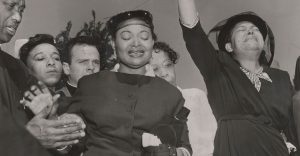Activism
Sen. Steven Bradford Brings Strength and Reason to Police Reform Fight
SB 2 would strengthen the Tom Bane Civil Rights Act. Enacted in 1987, that legislation prevents law enforcement abuses and other civil rights violations.

California State Sen. Steven Bradford (D-Gardena), chair of the California Legislative Black Caucus (CLBC), admits that he will meet challenges along the way as he fights for police reform in California.
Last week, at a Senate Judiciary Committee hearing he defended a bill he introduced in the Legislature that, if passed, would decertify cops for inappropriate behavior. During that appearance, Bradford made a persuasive case for police reform that was, at turns, forceful and thoughtful, bringing a cool head but passionate voice to a topic that has created a bitter divide in the California electorate, pitting advocates of police reform violently against people who support law enforcement.
“This is a tough issue but it’s a righteous issue,” Bradford told his colleagues.
“And we want to be intentional about what we are doing here in California when it comes to police reform,” he continued during his passionate closing argument for police reform on April 27. “That’s what this bill does. It’s intentional in what we are trying to achieve. This is a fair measure and far better than any that exist today.”
Co-authored by Senate President Pro Tem Toni G. Atkins (D-San Diego), Senate Bill (SB) 2 passed out of the Senate Judiciary Committee with a 7-2 vote that same day. Also known as the Kenneth Ross Jr. Police Decertification Act of 2021, the legislation aims to increase accountability for law enforcement officers that commit serious misconduct and illegally violate a person’s civil rights.
SB 2 will create a statewide process to revoke the certification of a peace officer following the conviction of serious crimes or termination from employment due to misconduct.
Bradford praised the judiciary committee’s majority vote, describing it as progress that would put California on the “right side of history.”
Atkins agrees.
“The passage of SB 2 (April 27) is another step toward the goal of achieving much-needed accountability in policing, and I thank Senator Bradford for his steadfast commitment to achieving critical and necessary reforms,” said Atkins. “As with anything this big, there is a lot of work ahead, and I remain committed to working with my colleagues to get this bill in the position to cross the finish line.”
The California Peace Officer Association (CPOA) believes that Bradford’s bill would turn the California Committee on Police Officer Standards and Training (POST) into an investigative agency. A sticking point for the group is that the people who would be given the authority to probe police misconduct would primarily be non-peace officers.
“We, of course, know that not all reform is a good reform, and CPOA among others is open to ‘reimagining public safety in California,” Shaun Rundle, CPOA’s deputy director said in a written statement about several police reform and public safety bills scheduled for hearings. “What we didn’t imagine, however, was the continued attacks against a noble profession who have proven to improve and drive down crime in this state year after year.”
With the passage of SB 2 out of committee, the legislation will move on to the Senate Appropriations Committee for consideration. If it advances out of that committee, SB 2 could head to a Senate floor vote.
During the Judiciary Committee hearing, which lasted for nearly three hours, a few senators expressed their support but asked Bradford to modify language pertaining to the Bane Act.
SB 2 would strengthen the Tom Bane Civil Rights Act. Enacted in 1987, that legislation prevents law enforcement abuses and other civil rights violations. Authored by California State Assemblymember Tom Bane, the legislation was created to allow victims to seek compensatory and punitive damages, attorney’s fees, and civil penalties.
Supporters of police reform in California say the Bane Act has been undercut by bad court decisions over the years. They argue that it was once an effective law intended to protect the civil rights of people in the state but has since been weakened as an effective check against police excessive use of force.
The California State Sheriffs’ Association views SB 2 as problematic, in terms of hiring, recruiting, and maintaining employees.
“We are concerned that the language removing employee immunity from state civil liability will result in individual peace officers hesitating or failing to act out of fear that actions they believe to be lawful may result in litigation and damages. In so doing, SB 2 will very likely jeopardize public safety and diminish our ability to recruit, hire, and retain qualified individuals,” the California State Sheriffs’ Association said in a written statement.
But Bradford says his bill essentially addresses rogue policing and hinders the ability of fired officers to find employment at other agencies even when they have a record of misconduct that got them terminated.
Among states that do not have a process to decertify cops for criminal behavior are Hawaii, New Jersey, Rhode Island, and California.
“We lead in technology, we lead in the environment, we lead in all those things that are important except for criminal justice reform,” Bradford said, referring to California’s reputation as a political trailblazer on several fronts.
People of color live in the communities where the majority of police misconduct incidents take place, Bradford said, adding that SB 2 will save Black and Brown lives.
“How many more people, regardless of color need to lose their lives because of the callous acts of law enforcement?” Bradford asked his colleagues. “There are two systems of justice in this country. But you’ll never know, and really understand. Its far different than anything any of you guys have encountered or will encounter.”
Activism
Four Bills Focus on Financial Compensation for Descendants of Enslaved People
This week, CBM examines four more bills in the package — each offering ways for Black Californians to receive restitution for past injustices — from housing assistance and reclamation of loss property to fairer pay and the establishment of a state agency charged with determining eligibility for reparations.

Edward Henderson
California Black Media
Last week, California Black Media (CBM) provided an update on four bills in the California Legislative Black Caucus (CLBC) 2025 Road to Repair package.
The 16 bills in the Black Caucus’s 2025 “Road to Repair” package focus on “repairing the generational harms caused by the cruel treatment of African American slaves in the United States and decades of systemic deprivation and injustice inflicted upon Black Californians,” said the CLBC in a release.
This week, CBM examines four more bills in the package — each offering ways for Black Californians to receive restitution for past injustices — from housing assistance and reclamation of lost property to fairer pay and the establishment of a state agency charged with determining eligibility for reparations.
Here are summaries of these bills, information about their authors, and updates on how far each one has advanced in the legislative process.
Assembly Bill (AB) 57
AB 57, introduced by Assemblymember Tina McKinnor (D-Inglewood), would require that at least 10% of the monies in the state’s home purchase assistance fund be made available to applicants who meet the requirements for a loan under the home purchase assistance program and are descendants of formerly enslaved people.
The Assembly Judiciary Committee is currently reviewing the legislation.
Assembly Bill (AB) 62
AB 62, also introduced by McKinnor, would require the Office of Legal Affairs to review, investigate, and make specific determinations regarding applications from people who claim they are the dispossessed owners of property seized from them because of racially motivated eminent domain. The bill would define “racially motivated eminent domain” to mean when the state acquires private property for public use and does not provide just compensation to the owner, due in whole or in part, to the owner’s race.
AB 62 is currently under review in the Judiciary Committee.
Senate Bill (SB) 464
SB 464, introduced by Sen. Lola Smallwood-Cuevas (D-Los Angeles), aims to strengthen the existing civil rights laws in California concerning employer pay data reporting. The bill mandates that private employers with 100 or more employees submit annual pay data reports to the Civil Rights Department. These reports must include detailed demographic information — including race, ethnicity, sex, and sexual orientation — pertaining to their workforce distribution and compensation across different job categories. Furthermore, beginning in 2027, public employers will also be required to comply with these reporting requirements.
The Senate Committee on Labor, Public Employment, and Rules is currently reviewing SB 464. A hearing is expected to be held on April 23.
Senate Bill (SB) 518
SB 518, introduced by Sen. Akilah Weber Pierson (D-San Diego), establishes the Bureau for Descendants of American Slavery to address and remedy the lasting harms of slavery and the Jim Crow laws suffered by Black Californians.
SB 518 is under review in the Senate Judiciary Committee. A hearing is expected to be held on April 22.
Activism
Faces Around the Bay: Author Karen Lewis Took the ‘Detour to Straight Street’
“My life has been a roller-coaster with an unlimited ride wristband! I was raised in Berkeley during the time of Ron Dellums, the Black Panthers, and People’s Park. I was a Hippie kid, my Auntie cut off all our hair so we could wear the natural styles like her and Angela Davis.

By Barbara Fluhrer
I met Karen Lewis on a park bench in Berkeley. She wrote her story on the spot.
“My life has been a roller-coaster with an unlimited ride wristband! I was raised in Berkeley during the time of Ron Dellums, the Black Panthers, and People’s Park. I was a Hippie kid, my Auntie cut off all our hair so we could wear the natural styles like her and Angela Davis.
I got married young, then ended up getting divorced, raising two boys into men. After my divorce, I had a stroke that left me blind and paralyzed. I was homeless, lost in a fog with blurred vision.
Jesus healed me! I now have two beautiful grandkids. At 61, this age and this stage, I am finally free indeed. Our Lord Jesus Christ saved my soul. I now know how to be still. I lay at his feet. I surrender and just rest. My life and every step on my path have already been ordered. So, I have learned in this life…it’s nice to be nice. No stressing, just blessings. Pray for the best and deal with the rest.
Nobody is perfect, so forgive quickly and love easily!”
Lewis’ book “Detour to Straight Street” is available on Amazon.
Activism
Barbara Lee Accepts Victory With “Responsibility, Humility and Love”
“I accept your choice with a deep sense of responsibility, humility, and love. Oakland is a deeply divided City,” Lee said in an April 19 statement. “I answered the call to run to unite our community, so that I can represent every voter, and we can all work together as One Oakland to solve our most pressing problems.”

By Antonio Ray Harvey,
California Black Media
As a candidate for mayor, former U.S. Representative Barbara Lee released a “10-point plan” last week to reassure residents that she will tackle Oakland’s most pressing challenges.
Now that she has edged out her competitors in the ranked-choice special election with 50% or more of the vote, the former Congresswoman, who represented parts of the Bay Area in the U.S. House of Representatives, can put her vision in motion as the city’s first Black woman mayor.
“I accept your choice with a deep sense of responsibility, humility, and love. Oakland is a deeply divided City,” Lee said in an April 19 statement. “I answered the call to run to unite our community, so that I can represent every voter, and we can all work together as One Oakland to solve our most pressing problems.”
On Saturday evening, Taylor conceded to Lee. There are still about 300 Vote-by-Mail ballots left to be verified, according to county election officials. The ballots will be processed on April 21 and April 22.
“This morning, I called Congresswoman Barbara Lee to congratulate her on becoming the next Mayor of Oakland,” Taylor said in a statement.
“I pray that Mayor-Elect Lee fulfills her commitment to unify Oakland by authentically engaging the 47% of Oaklanders who voted for me and who want pragmatic, results-driven leadership.”
The influential Oakland Post endorsed Lee’s campaign, commending her leadership on the local, state, and federal levels.
Paul Cobb, The Post’s publisher, told California Black Media that Lee will bring back “respect and accountability” to the mayor’s office.
“She is going to be a collegial leader drawing on the advice of community nonprofit organizations and those who have experience in dealing with various issues,” Cobb said. “She’s going to try to do a consensus-building thing among those who know the present problems that face the city.”
Born in El Paso, Texas, Lee’s family moved to California while she was in high school. At 20 years old, Lee divorced her husband after the birth of her first child. After the split, Lee went through a tough period, becoming homeless and having to apply for public assistance to make ends meet.
But destitution did not deter the young woman.
Lee groomed herself to become an activist and advocate in Oakland and committed to standing up for the most vulnerable citizens in her community.
Lee traveled to Washington, D.C. to work for then U.S. Congressman Ron Dellums after receiving a Bachelor of Arts degree from Mills College in Oakland in 1973. Lee later won a U.S. Department of Housing and Urban Development (HUD) fellowship to attend the School of Social Welfare, and she earned a Master of Social Work from the University of California-Berkeley in 1975.
Lee later served in the California State Assembly and State Senate before she was elected to Congress in 1998.
After serving in the U.S. Congress for more than 25 years, Lee ran unsuccessfully for California’s U.S. Senate in the 2024 primary election.
Lee joins current Los Angeles mayor Karen Bass and former San Francisco Mayor London Breed as Black women serving as chief executives of major cities in California over the last few years.
-

 Activism4 weeks ago
Activism4 weeks agoOakland Post Endorses Barbara Lee
-

 Activism3 weeks ago
Activism3 weeks agoOakland Post: Week of April 2 – 8, 2025
-

 #NNPA BlackPress3 weeks ago
#NNPA BlackPress3 weeks agoTrump Profits, Black America Pays the Price
-

 Activism2 weeks ago
Activism2 weeks agoOakland Post: Week of April 9 – 15, 2025
-

 #NNPA BlackPress3 weeks ago
#NNPA BlackPress3 weeks agoHarriet Tubman Scrubbed; DEI Dismantled
-

 #NNPA BlackPress3 weeks ago
#NNPA BlackPress3 weeks agoTrump Targets a Slavery Removal from the National Museum of African-American History and Culture
-

 #NNPA BlackPress3 weeks ago
#NNPA BlackPress3 weeks agoLawmakers Greenlight Reparations Study for Descendants of Enslaved Marylanders
-

 #NNPA BlackPress3 weeks ago
#NNPA BlackPress3 weeks agoNew York Stands Firm Against Trump Administration’s Order to Abandon Diversity in Schools
























































